Analyzing Sport Events' Influence on Melbourne Tourism and Hospitality
VerifiedAdded on 2023/01/13
|10
|1695
|61
Report
AI Summary
This report investigates the significant impact of sporting events on Melbourne's tourism and hospitality industries. It begins with an abstract and table of contents, followed by an introduction that highlights the importance of tourism and the role of Melbourne as a sporting destination. The report explores the aims and objectives, research questions, and a comprehensive literature review covering the concepts of sporting events and their effects on both the tourism and hospitality sectors. The methodology section details the data collection and analysis methods, sample size, ethical considerations, and limitations. A Gantt chart outlines the project timeline, and the expected outcomes are discussed, emphasizing the potential for increased revenue and economic value. The report concludes with a list of references, providing a detailed overview of the research process and findings.
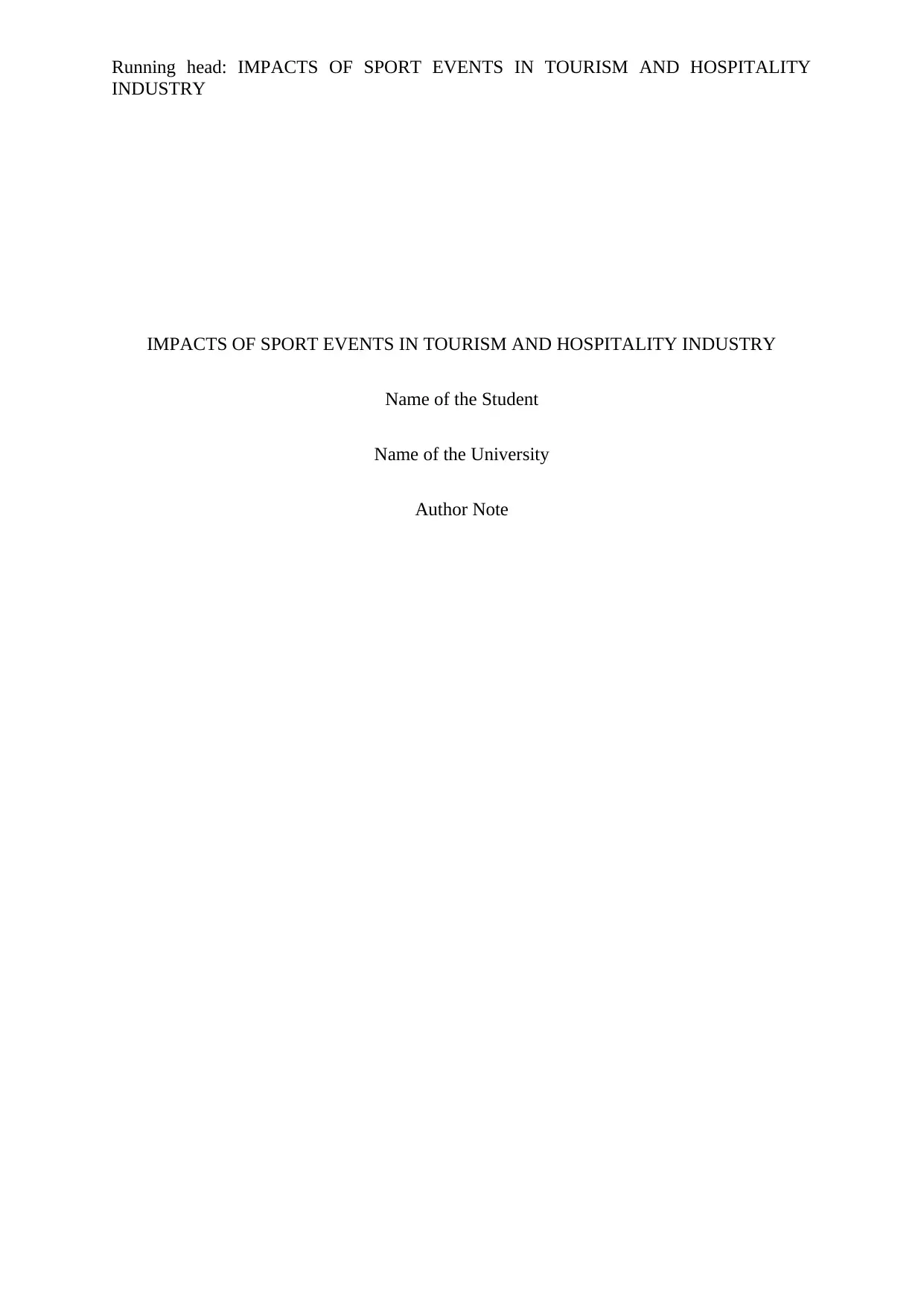
Running head: IMPACTS OF SPORT EVENTS IN TOURISM AND HOSPITALITY
INDUSTRY
IMPACTS OF SPORT EVENTS IN TOURISM AND HOSPITALITY INDUSTRY
Name of the Student
Name of the University
Author Note
INDUSTRY
IMPACTS OF SPORT EVENTS IN TOURISM AND HOSPITALITY INDUSTRY
Name of the Student
Name of the University
Author Note
Paraphrase This Document
Need a fresh take? Get an instant paraphrase of this document with our AI Paraphraser
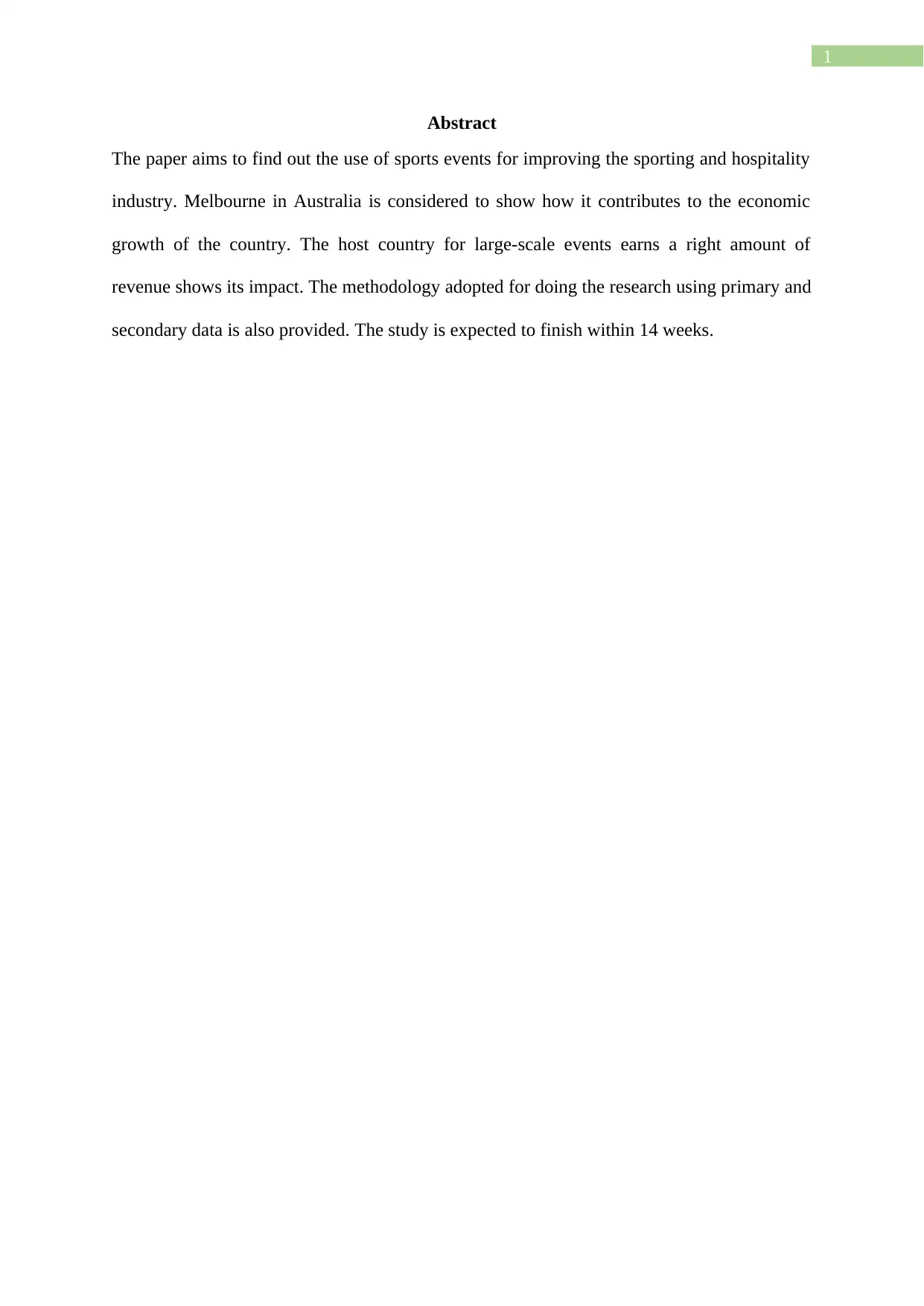
1
Abstract
The paper aims to find out the use of sports events for improving the sporting and hospitality
industry. Melbourne in Australia is considered to show how it contributes to the economic
growth of the country. The host country for large-scale events earns a right amount of
revenue shows its impact. The methodology adopted for doing the research using primary and
secondary data is also provided. The study is expected to finish within 14 weeks.
Abstract
The paper aims to find out the use of sports events for improving the sporting and hospitality
industry. Melbourne in Australia is considered to show how it contributes to the economic
growth of the country. The host country for large-scale events earns a right amount of
revenue shows its impact. The methodology adopted for doing the research using primary and
secondary data is also provided. The study is expected to finish within 14 weeks.

2
⊘ This is a preview!⊘
Do you want full access?
Subscribe today to unlock all pages.

Trusted by 1+ million students worldwide
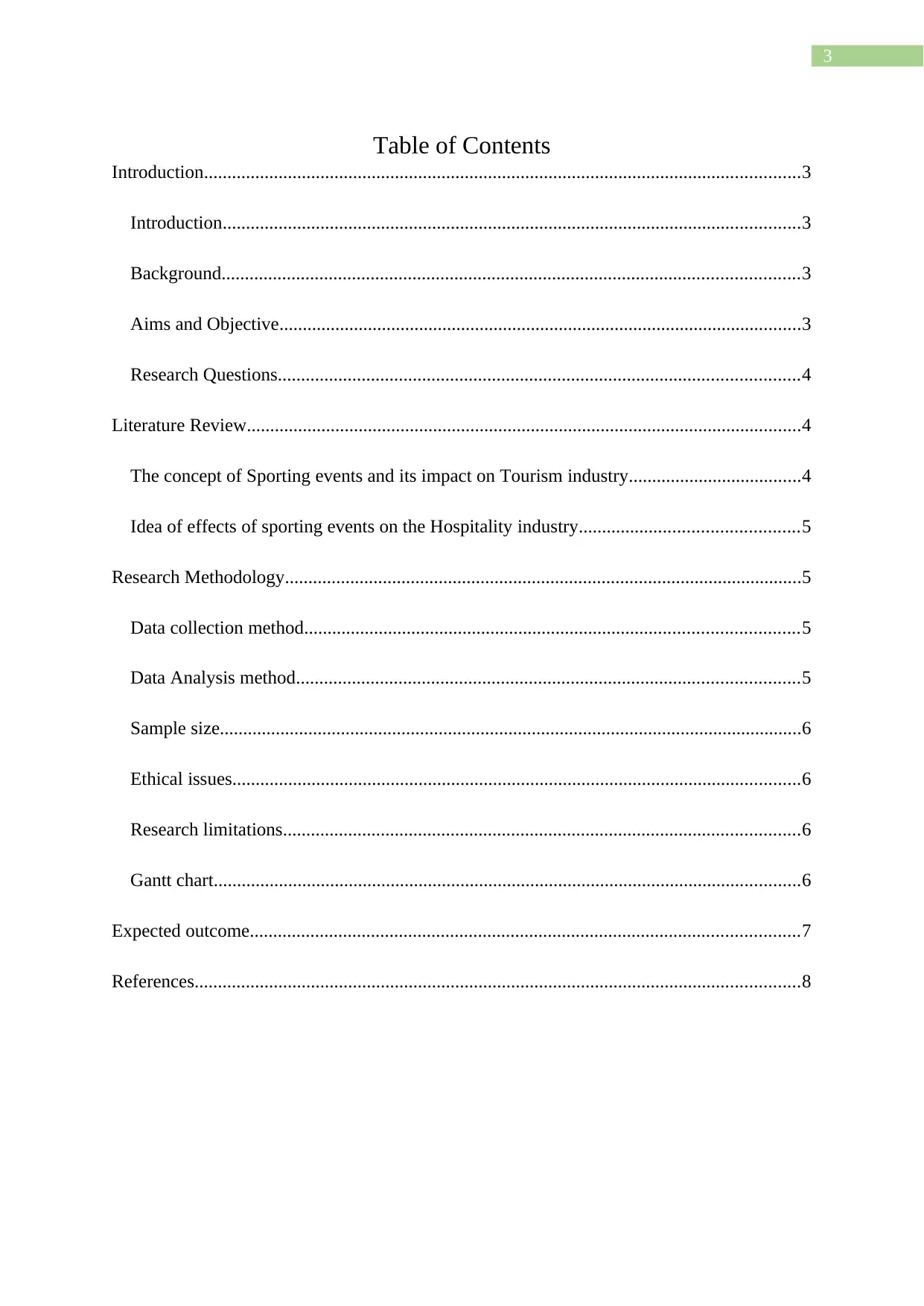
3
Table of Contents
Introduction................................................................................................................................3
Introduction............................................................................................................................3
Background............................................................................................................................3
Aims and Objective................................................................................................................3
Research Questions................................................................................................................4
Literature Review.......................................................................................................................4
The concept of Sporting events and its impact on Tourism industry.....................................4
Idea of effects of sporting events on the Hospitality industry...............................................5
Research Methodology...............................................................................................................5
Data collection method..........................................................................................................5
Data Analysis method............................................................................................................5
Sample size.............................................................................................................................6
Ethical issues..........................................................................................................................6
Research limitations...............................................................................................................6
Gantt chart..............................................................................................................................6
Expected outcome......................................................................................................................7
References..................................................................................................................................8
Table of Contents
Introduction................................................................................................................................3
Introduction............................................................................................................................3
Background............................................................................................................................3
Aims and Objective................................................................................................................3
Research Questions................................................................................................................4
Literature Review.......................................................................................................................4
The concept of Sporting events and its impact on Tourism industry.....................................4
Idea of effects of sporting events on the Hospitality industry...............................................5
Research Methodology...............................................................................................................5
Data collection method..........................................................................................................5
Data Analysis method............................................................................................................5
Sample size.............................................................................................................................6
Ethical issues..........................................................................................................................6
Research limitations...............................................................................................................6
Gantt chart..............................................................................................................................6
Expected outcome......................................................................................................................7
References..................................................................................................................................8
Paraphrase This Document
Need a fresh take? Get an instant paraphrase of this document with our AI Paraphraser
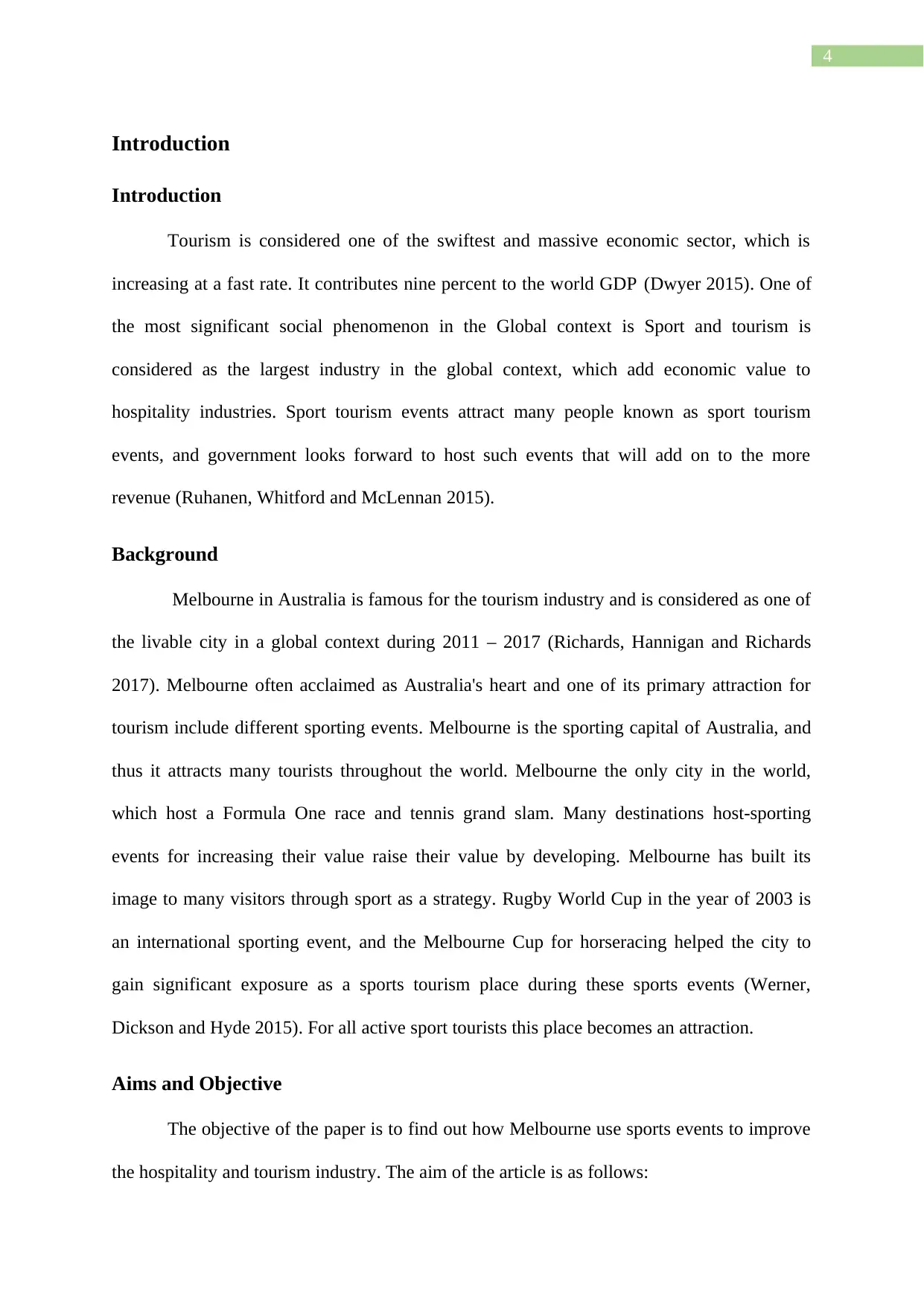
4
Introduction
Introduction
Tourism is considered one of the swiftest and massive economic sector, which is
increasing at a fast rate. It contributes nine percent to the world GDP (Dwyer 2015). One of
the most significant social phenomenon in the Global context is Sport and tourism is
considered as the largest industry in the global context, which add economic value to
hospitality industries. Sport tourism events attract many people known as sport tourism
events, and government looks forward to host such events that will add on to the more
revenue (Ruhanen, Whitford and McLennan 2015).
Background
Melbourne in Australia is famous for the tourism industry and is considered as one of
the livable city in a global context during 2011 – 2017 (Richards, Hannigan and Richards
2017). Melbourne often acclaimed as Australia's heart and one of its primary attraction for
tourism include different sporting events. Melbourne is the sporting capital of Australia, and
thus it attracts many tourists throughout the world. Melbourne the only city in the world,
which host a Formula One race and tennis grand slam. Many destinations host-sporting
events for increasing their value raise their value by developing. Melbourne has built its
image to many visitors through sport as a strategy. Rugby World Cup in the year of 2003 is
an international sporting event, and the Melbourne Cup for horseracing helped the city to
gain significant exposure as a sports tourism place during these sports events (Werner,
Dickson and Hyde 2015). For all active sport tourists this place becomes an attraction.
Aims and Objective
The objective of the paper is to find out how Melbourne use sports events to improve
the hospitality and tourism industry. The aim of the article is as follows:
Introduction
Introduction
Tourism is considered one of the swiftest and massive economic sector, which is
increasing at a fast rate. It contributes nine percent to the world GDP (Dwyer 2015). One of
the most significant social phenomenon in the Global context is Sport and tourism is
considered as the largest industry in the global context, which add economic value to
hospitality industries. Sport tourism events attract many people known as sport tourism
events, and government looks forward to host such events that will add on to the more
revenue (Ruhanen, Whitford and McLennan 2015).
Background
Melbourne in Australia is famous for the tourism industry and is considered as one of
the livable city in a global context during 2011 – 2017 (Richards, Hannigan and Richards
2017). Melbourne often acclaimed as Australia's heart and one of its primary attraction for
tourism include different sporting events. Melbourne is the sporting capital of Australia, and
thus it attracts many tourists throughout the world. Melbourne the only city in the world,
which host a Formula One race and tennis grand slam. Many destinations host-sporting
events for increasing their value raise their value by developing. Melbourne has built its
image to many visitors through sport as a strategy. Rugby World Cup in the year of 2003 is
an international sporting event, and the Melbourne Cup for horseracing helped the city to
gain significant exposure as a sports tourism place during these sports events (Werner,
Dickson and Hyde 2015). For all active sport tourists this place becomes an attraction.
Aims and Objective
The objective of the paper is to find out how Melbourne use sports events to improve
the hospitality and tourism industry. The aim of the article is as follows:
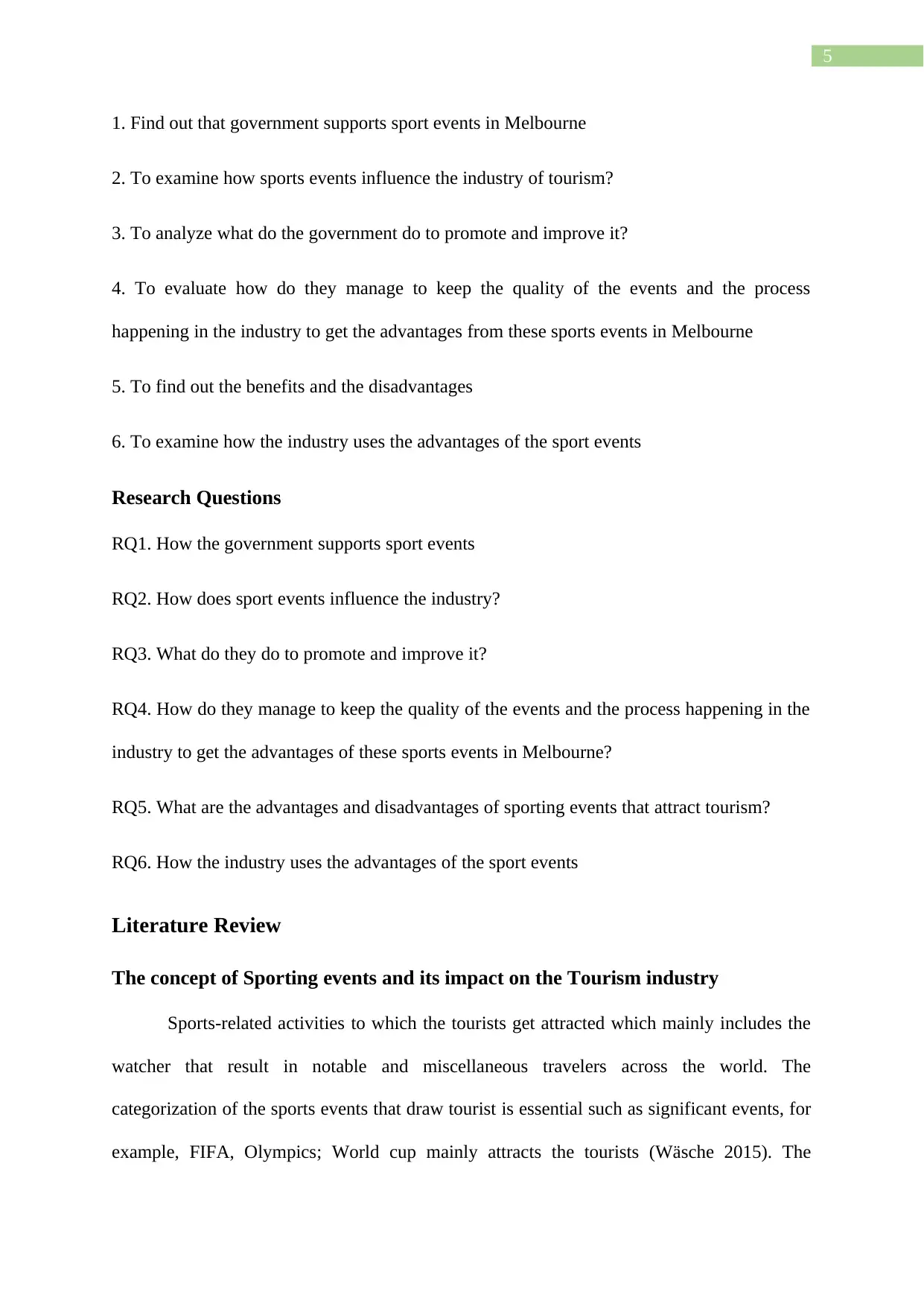
5
1. Find out that government supports sport events in Melbourne
2. To examine how sports events influence the industry of tourism?
3. To analyze what do the government do to promote and improve it?
4. To evaluate how do they manage to keep the quality of the events and the process
happening in the industry to get the advantages from these sports events in Melbourne
5. To find out the benefits and the disadvantages
6. To examine how the industry uses the advantages of the sport events
Research Questions
RQ1. How the government supports sport events
RQ2. How does sport events influence the industry?
RQ3. What do they do to promote and improve it?
RQ4. How do they manage to keep the quality of the events and the process happening in the
industry to get the advantages of these sports events in Melbourne?
RQ5. What are the advantages and disadvantages of sporting events that attract tourism?
RQ6. How the industry uses the advantages of the sport events
Literature Review
The concept of Sporting events and its impact on the Tourism industry
Sports-related activities to which the tourists get attracted which mainly includes the
watcher that result in notable and miscellaneous travelers across the world. The
categorization of the sports events that draw tourist is essential such as significant events, for
example, FIFA, Olympics; World cup mainly attracts the tourists (Wäsche 2015). The
1. Find out that government supports sport events in Melbourne
2. To examine how sports events influence the industry of tourism?
3. To analyze what do the government do to promote and improve it?
4. To evaluate how do they manage to keep the quality of the events and the process
happening in the industry to get the advantages from these sports events in Melbourne
5. To find out the benefits and the disadvantages
6. To examine how the industry uses the advantages of the sport events
Research Questions
RQ1. How the government supports sport events
RQ2. How does sport events influence the industry?
RQ3. What do they do to promote and improve it?
RQ4. How do they manage to keep the quality of the events and the process happening in the
industry to get the advantages of these sports events in Melbourne?
RQ5. What are the advantages and disadvantages of sporting events that attract tourism?
RQ6. How the industry uses the advantages of the sport events
Literature Review
The concept of Sporting events and its impact on the Tourism industry
Sports-related activities to which the tourists get attracted which mainly includes the
watcher that result in notable and miscellaneous travelers across the world. The
categorization of the sports events that draw tourist is essential such as significant events, for
example, FIFA, Olympics; World cup mainly attracts the tourists (Wäsche 2015). The
⊘ This is a preview!⊘
Do you want full access?
Subscribe today to unlock all pages.

Trusted by 1+ million students worldwide
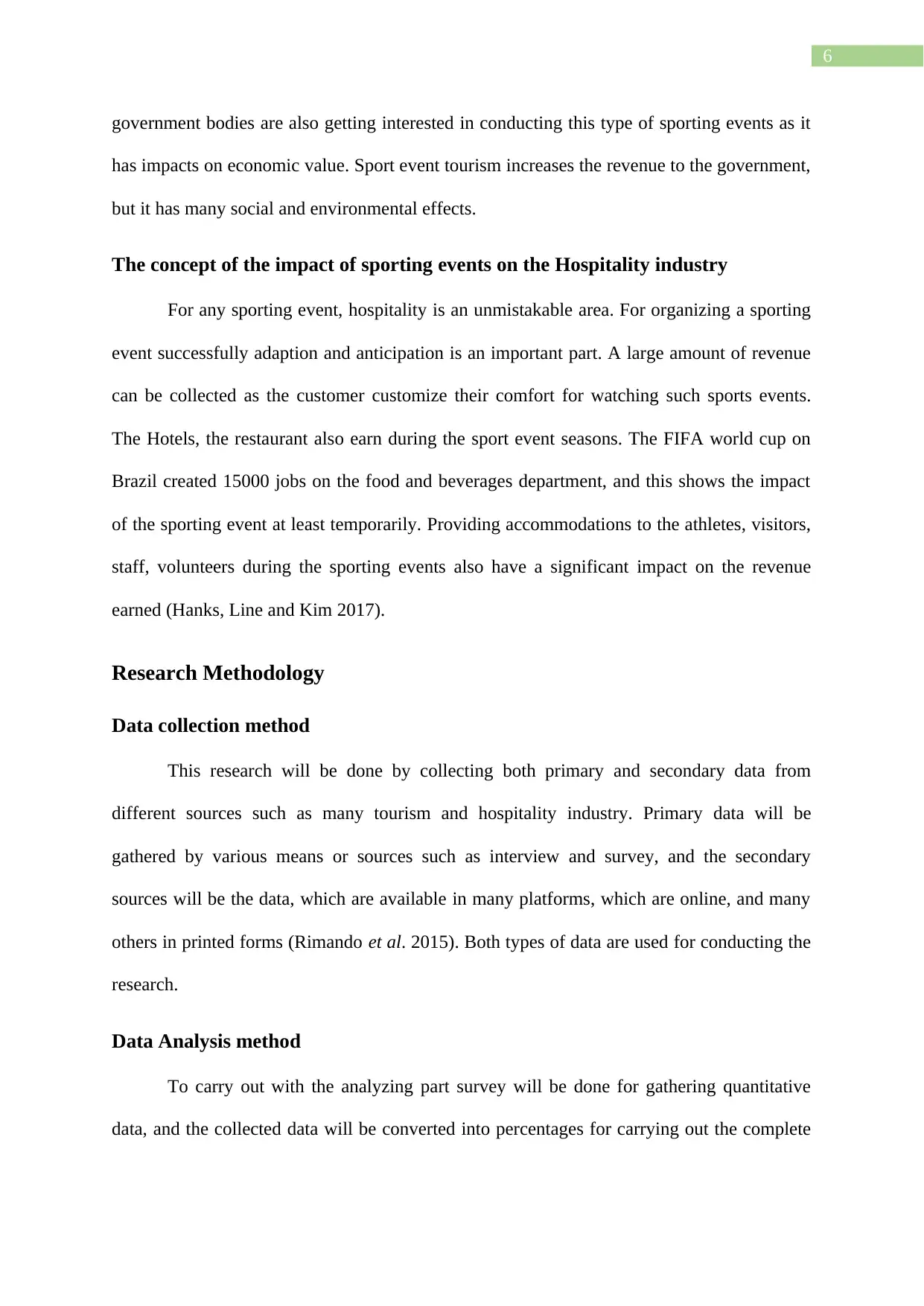
6
government bodies are also getting interested in conducting this type of sporting events as it
has impacts on economic value. Sport event tourism increases the revenue to the government,
but it has many social and environmental effects.
The concept of the impact of sporting events on the Hospitality industry
For any sporting event, hospitality is an unmistakable area. For organizing a sporting
event successfully adaption and anticipation is an important part. A large amount of revenue
can be collected as the customer customize their comfort for watching such sports events.
The Hotels, the restaurant also earn during the sport event seasons. The FIFA world cup on
Brazil created 15000 jobs on the food and beverages department, and this shows the impact
of the sporting event at least temporarily. Providing accommodations to the athletes, visitors,
staff, volunteers during the sporting events also have a significant impact on the revenue
earned (Hanks, Line and Kim 2017).
Research Methodology
Data collection method
This research will be done by collecting both primary and secondary data from
different sources such as many tourism and hospitality industry. Primary data will be
gathered by various means or sources such as interview and survey, and the secondary
sources will be the data, which are available in many platforms, which are online, and many
others in printed forms (Rimando et al. 2015). Both types of data are used for conducting the
research.
Data Analysis method
To carry out with the analyzing part survey will be done for gathering quantitative
data, and the collected data will be converted into percentages for carrying out the complete
government bodies are also getting interested in conducting this type of sporting events as it
has impacts on economic value. Sport event tourism increases the revenue to the government,
but it has many social and environmental effects.
The concept of the impact of sporting events on the Hospitality industry
For any sporting event, hospitality is an unmistakable area. For organizing a sporting
event successfully adaption and anticipation is an important part. A large amount of revenue
can be collected as the customer customize their comfort for watching such sports events.
The Hotels, the restaurant also earn during the sport event seasons. The FIFA world cup on
Brazil created 15000 jobs on the food and beverages department, and this shows the impact
of the sporting event at least temporarily. Providing accommodations to the athletes, visitors,
staff, volunteers during the sporting events also have a significant impact on the revenue
earned (Hanks, Line and Kim 2017).
Research Methodology
Data collection method
This research will be done by collecting both primary and secondary data from
different sources such as many tourism and hospitality industry. Primary data will be
gathered by various means or sources such as interview and survey, and the secondary
sources will be the data, which are available in many platforms, which are online, and many
others in printed forms (Rimando et al. 2015). Both types of data are used for conducting the
research.
Data Analysis method
To carry out with the analyzing part survey will be done for gathering quantitative
data, and the collected data will be converted into percentages for carrying out the complete
Paraphrase This Document
Need a fresh take? Get an instant paraphrase of this document with our AI Paraphraser
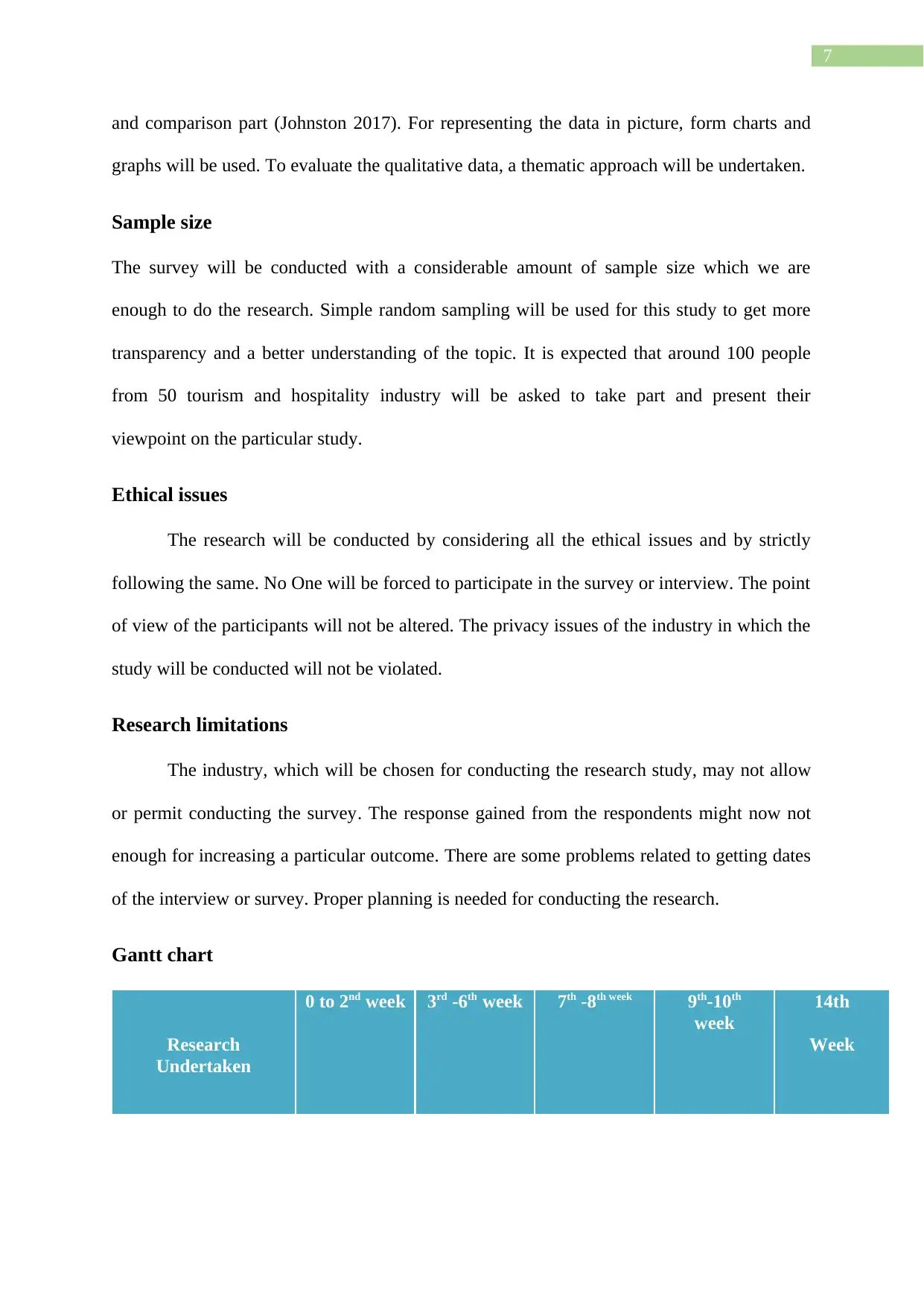
7
and comparison part (Johnston 2017). For representing the data in picture, form charts and
graphs will be used. To evaluate the qualitative data, a thematic approach will be undertaken.
Sample size
The survey will be conducted with a considerable amount of sample size which we are
enough to do the research. Simple random sampling will be used for this study to get more
transparency and a better understanding of the topic. It is expected that around 100 people
from 50 tourism and hospitality industry will be asked to take part and present their
viewpoint on the particular study.
Ethical issues
The research will be conducted by considering all the ethical issues and by strictly
following the same. No One will be forced to participate in the survey or interview. The point
of view of the participants will not be altered. The privacy issues of the industry in which the
study will be conducted will not be violated.
Research limitations
The industry, which will be chosen for conducting the research study, may not allow
or permit conducting the survey. The response gained from the respondents might now not
enough for increasing a particular outcome. There are some problems related to getting dates
of the interview or survey. Proper planning is needed for conducting the research.
Gantt chart
0 to 2nd week 3rd -6th week 7th -8th week 9th-10th
week
14th
Research
Undertaken
Week
and comparison part (Johnston 2017). For representing the data in picture, form charts and
graphs will be used. To evaluate the qualitative data, a thematic approach will be undertaken.
Sample size
The survey will be conducted with a considerable amount of sample size which we are
enough to do the research. Simple random sampling will be used for this study to get more
transparency and a better understanding of the topic. It is expected that around 100 people
from 50 tourism and hospitality industry will be asked to take part and present their
viewpoint on the particular study.
Ethical issues
The research will be conducted by considering all the ethical issues and by strictly
following the same. No One will be forced to participate in the survey or interview. The point
of view of the participants will not be altered. The privacy issues of the industry in which the
study will be conducted will not be violated.
Research limitations
The industry, which will be chosen for conducting the research study, may not allow
or permit conducting the survey. The response gained from the respondents might now not
enough for increasing a particular outcome. There are some problems related to getting dates
of the interview or survey. Proper planning is needed for conducting the research.
Gantt chart
0 to 2nd week 3rd -6th week 7th -8th week 9th-10th
week
14th
Research
Undertaken
Week
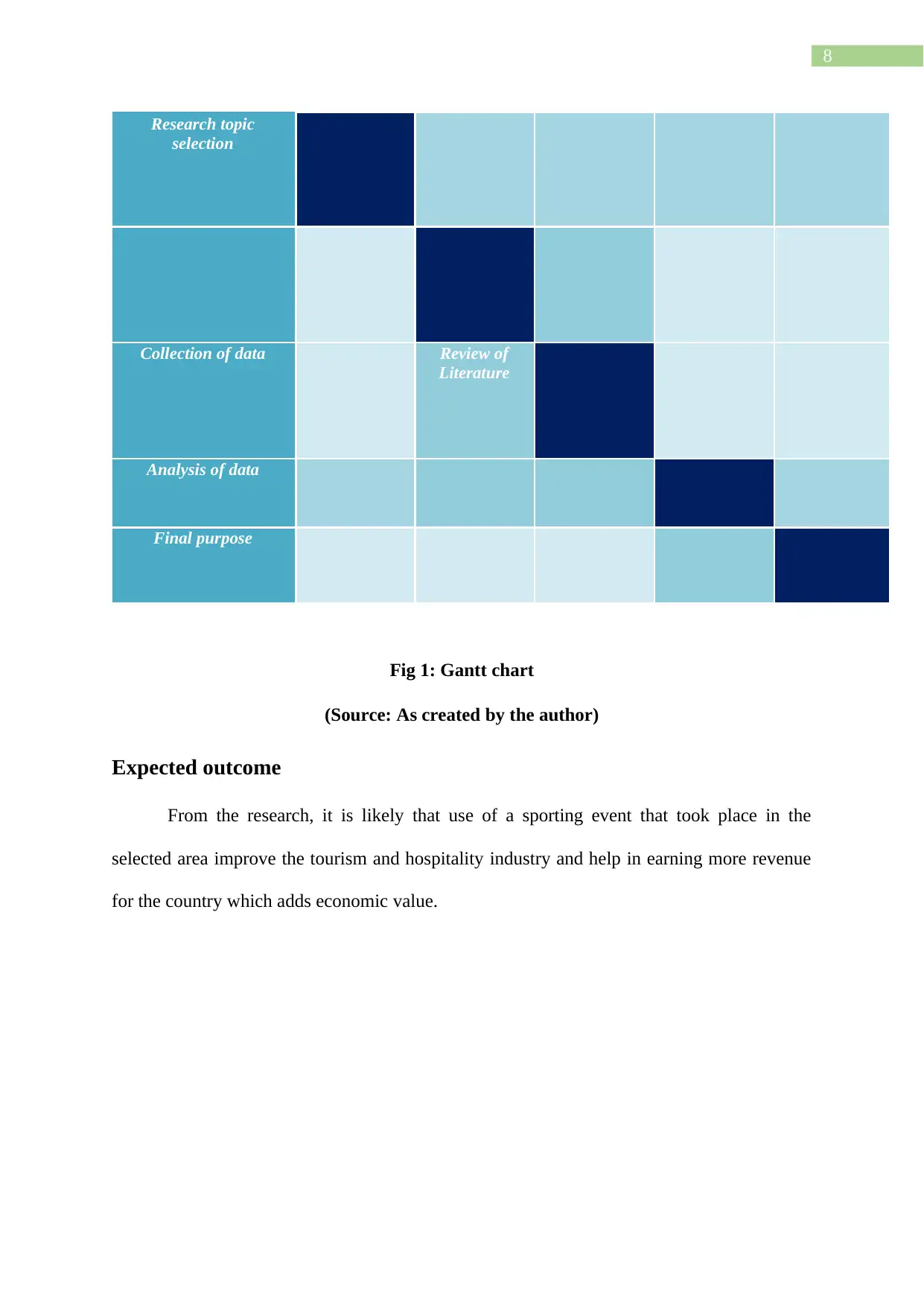
8
Research topic
selection
Collection of data Review of
Literature
Analysis of data
Final purpose
Fig 1: Gantt chart
(Source: As created by the author)
Expected outcome
From the research, it is likely that use of a sporting event that took place in the
selected area improve the tourism and hospitality industry and help in earning more revenue
for the country which adds economic value.
Research topic
selection
Collection of data Review of
Literature
Analysis of data
Final purpose
Fig 1: Gantt chart
(Source: As created by the author)
Expected outcome
From the research, it is likely that use of a sporting event that took place in the
selected area improve the tourism and hospitality industry and help in earning more revenue
for the country which adds economic value.
⊘ This is a preview!⊘
Do you want full access?
Subscribe today to unlock all pages.

Trusted by 1+ million students worldwide
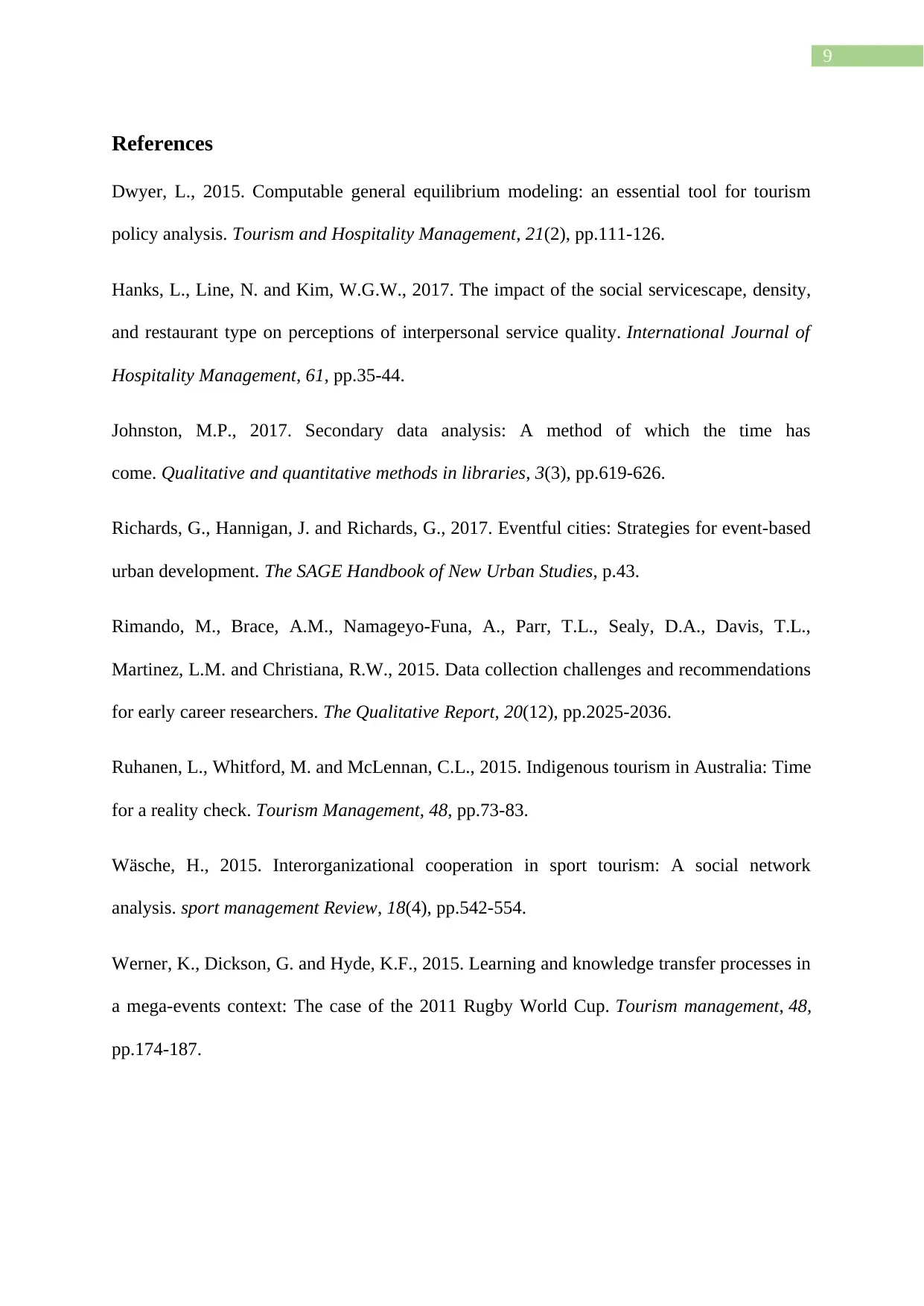
9
References
Dwyer, L., 2015. Computable general equilibrium modeling: an essential tool for tourism
policy analysis. Tourism and Hospitality Management, 21(2), pp.111-126.
Hanks, L., Line, N. and Kim, W.G.W., 2017. The impact of the social servicescape, density,
and restaurant type on perceptions of interpersonal service quality. International Journal of
Hospitality Management, 61, pp.35-44.
Johnston, M.P., 2017. Secondary data analysis: A method of which the time has
come. Qualitative and quantitative methods in libraries, 3(3), pp.619-626.
Richards, G., Hannigan, J. and Richards, G., 2017. Eventful cities: Strategies for event-based
urban development. The SAGE Handbook of New Urban Studies, p.43.
Rimando, M., Brace, A.M., Namageyo-Funa, A., Parr, T.L., Sealy, D.A., Davis, T.L.,
Martinez, L.M. and Christiana, R.W., 2015. Data collection challenges and recommendations
for early career researchers. The Qualitative Report, 20(12), pp.2025-2036.
Ruhanen, L., Whitford, M. and McLennan, C.L., 2015. Indigenous tourism in Australia: Time
for a reality check. Tourism Management, 48, pp.73-83.
Wäsche, H., 2015. Interorganizational cooperation in sport tourism: A social network
analysis. sport management Review, 18(4), pp.542-554.
Werner, K., Dickson, G. and Hyde, K.F., 2015. Learning and knowledge transfer processes in
a mega-events context: The case of the 2011 Rugby World Cup. Tourism management, 48,
pp.174-187.
References
Dwyer, L., 2015. Computable general equilibrium modeling: an essential tool for tourism
policy analysis. Tourism and Hospitality Management, 21(2), pp.111-126.
Hanks, L., Line, N. and Kim, W.G.W., 2017. The impact of the social servicescape, density,
and restaurant type on perceptions of interpersonal service quality. International Journal of
Hospitality Management, 61, pp.35-44.
Johnston, M.P., 2017. Secondary data analysis: A method of which the time has
come. Qualitative and quantitative methods in libraries, 3(3), pp.619-626.
Richards, G., Hannigan, J. and Richards, G., 2017. Eventful cities: Strategies for event-based
urban development. The SAGE Handbook of New Urban Studies, p.43.
Rimando, M., Brace, A.M., Namageyo-Funa, A., Parr, T.L., Sealy, D.A., Davis, T.L.,
Martinez, L.M. and Christiana, R.W., 2015. Data collection challenges and recommendations
for early career researchers. The Qualitative Report, 20(12), pp.2025-2036.
Ruhanen, L., Whitford, M. and McLennan, C.L., 2015. Indigenous tourism in Australia: Time
for a reality check. Tourism Management, 48, pp.73-83.
Wäsche, H., 2015. Interorganizational cooperation in sport tourism: A social network
analysis. sport management Review, 18(4), pp.542-554.
Werner, K., Dickson, G. and Hyde, K.F., 2015. Learning and knowledge transfer processes in
a mega-events context: The case of the 2011 Rugby World Cup. Tourism management, 48,
pp.174-187.
1 out of 10
Related Documents
Your All-in-One AI-Powered Toolkit for Academic Success.
+13062052269
info@desklib.com
Available 24*7 on WhatsApp / Email
![[object Object]](/_next/static/media/star-bottom.7253800d.svg)
Unlock your academic potential
Copyright © 2020–2026 A2Z Services. All Rights Reserved. Developed and managed by ZUCOL.





